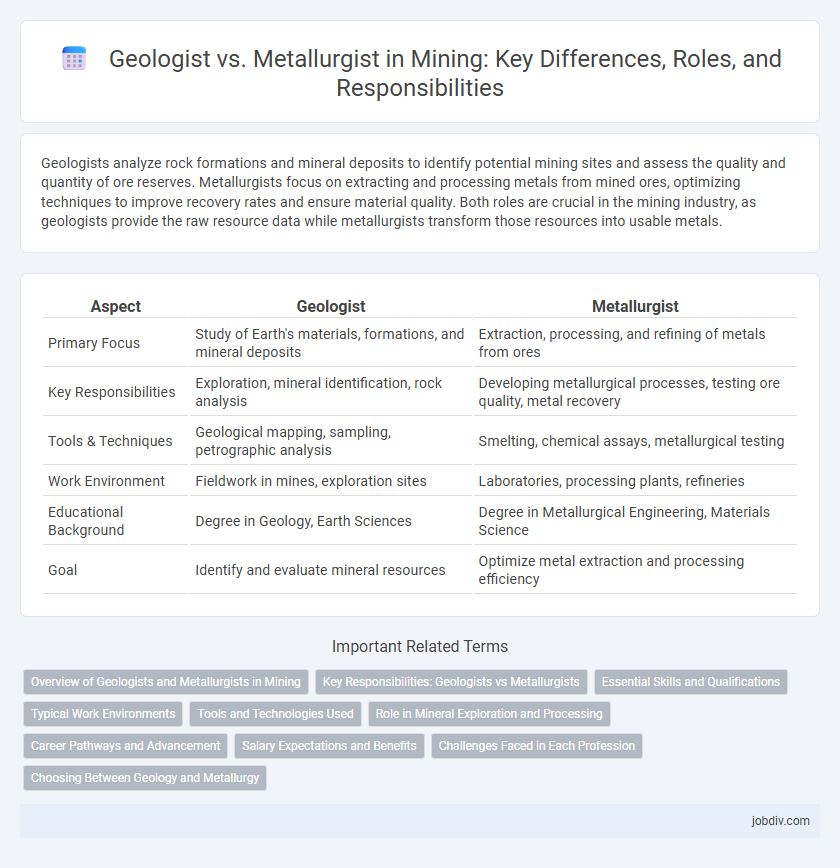Geologists analyze rock formations and mineral deposits to identify potential mining sites and assess the quality and quantity of ore reserves. Metallurgists focus on extracting and processing metals from mined ores, optimizing techniques to improve recovery rates and ensure material quality. Both roles are crucial in the mining industry, as geologists provide the raw resource data while metallurgists transform those resources into usable metals.
Table of Comparison
| Aspect | Geologist | Metallurgist |
|---|---|---|
| Primary Focus | Study of Earth's materials, formations, and mineral deposits | Extraction, processing, and refining of metals from ores |
| Key Responsibilities | Exploration, mineral identification, rock analysis | Developing metallurgical processes, testing ore quality, metal recovery |
| Tools & Techniques | Geological mapping, sampling, petrographic analysis | Smelting, chemical assays, metallurgical testing |
| Work Environment | Fieldwork in mines, exploration sites | Laboratories, processing plants, refineries |
| Educational Background | Degree in Geology, Earth Sciences | Degree in Metallurgical Engineering, Materials Science |
| Goal | Identify and evaluate mineral resources | Optimize metal extraction and processing efficiency |
Overview of Geologists and Metallurgists in Mining
Geologists in mining specialize in studying rock formations, mineral deposits, and earth processes to identify potential mining sites and assess resource quality. Metallurgists focus on the extraction, refining, and processing of metals from ores, optimizing recovery and ensuring material quality for industrial use. Both roles are crucial for efficient mine planning, resource evaluation, and maximizing economic extraction in the mining industry.
Key Responsibilities: Geologists vs Metallurgists
Geologists analyze rock formations, mineral deposits, and geological data to identify and evaluate mining sites, ensuring resource estimation and environmental impact assessments are accurate. Metallurgists focus on the extraction, refining, and processing of metals from ores, optimizing techniques to improve recovery rates and metal purity. Both roles collaborate to maximize resource utilization and operational efficiency in mining projects.
Essential Skills and Qualifications
Geologists require strong expertise in earth sciences, including mineralogy, petrology, and structural geology, with proficiency in geological mapping software and fieldwork analysis. Metallurgists must have a background in materials science, chemical engineering, and metallurgy, specializing in ore processing techniques, extraction methods, and metallurgical testing. Both professions demand critical analytical skills, proficiency in data interpretation, and relevant degrees such as a Bachelor's or Master's in Geology or Metallurgical Engineering for career advancement.
Typical Work Environments
Geologists primarily work in field sites such as mines, quarries, and remote exploration locations, conducting rock sampling and geological mapping to identify mineral deposits. Metallurgists are mostly based in laboratories, processing plants, or pilot plants where they analyze and optimize metal extraction and refining techniques. Both professionals collaborate closely in mining operations to ensure efficient resource extraction and material quality control.
Tools and Technologies Used
Geologists utilize tools such as GIS software, rock hammers, and core sampling equipment to analyze mineral deposits and assess geological formations. Metallurgists rely on technologies like spectrometers, electron microscopes, and process simulation software to study metal properties and optimize extraction processes. Both professionals integrate advanced data analysis and laboratory instruments to enhance mining efficiency and resource management.
Role in Mineral Exploration and Processing
Geologists identify and analyze mineral deposits by studying rock formations, geological maps, and sampling to determine the location, quantity, and quality of minerals. Metallurgists focus on the extraction and processing of these minerals, developing methods to efficiently separate valuable metals from ores through physical and chemical techniques. Both roles are crucial in mining operations, with geologists guiding exploration and metallurgists optimizing mineral recovery and refining processes.
Career Pathways and Advancement
Geologists typically advance by specializing in exploration techniques, resource estimation, and environmental geology, often moving into senior roles such as project manager or chief geologist. Metallurgists focus on extractive metallurgy, process optimization, and materials analysis, with career progression leading to positions like process engineer, plant manager, or research director. Both career pathways benefit from continuous professional development and industry certifications to enhance expertise and leadership opportunities in mining operations.
Salary Expectations and Benefits
Geologists in mining typically earn an annual salary ranging from $70,000 to $110,000, reflecting their expertise in earth sciences and mineral exploration, while metallurgists command salaries between $75,000 and $120,000 due to their specialization in metal extraction and processing technologies. Both roles often receive comprehensive benefits, including health insurance, retirement plans, and performance bonuses, though metallurgists may have higher earning potential in advanced smelting and refining operations. Salary variations depend on experience, location, and the specific mining sector, with metallurgists generally positioned for greater long-term financial growth.
Challenges Faced in Each Profession
Geologists face challenges in accurately identifying mineral deposits and assessing geological risks, requiring advanced knowledge in earth sciences and fieldwork under harsh conditions. Metallurgists encounter difficulties in optimizing extraction processes and improving metal quality while minimizing environmental impact, demanding expertise in materials science and industrial engineering. Both professions require problem-solving skills but differ in their focus on natural resource evaluation versus material processing efficiency.
Choosing Between Geology and Metallurgy
Choosing between geology and metallurgy depends on one's interest in earth materials versus metal processing. Geologists analyze rock formations, mineral deposits, and environmental impacts, providing critical insights for exploration and sustainable mining practices. Metallurgists focus on extracting and refining metals, optimizing extraction techniques, and improving material properties for industrial applications.
Geologist vs Metallurgist Infographic

 jobdiv.com
jobdiv.com